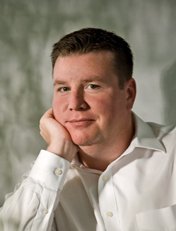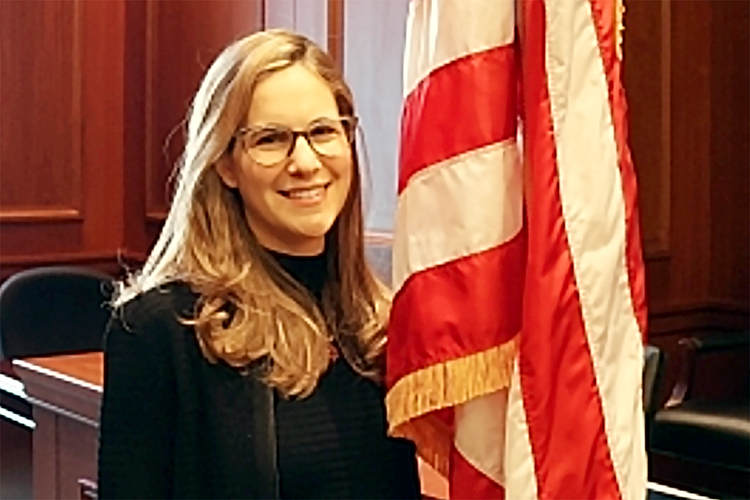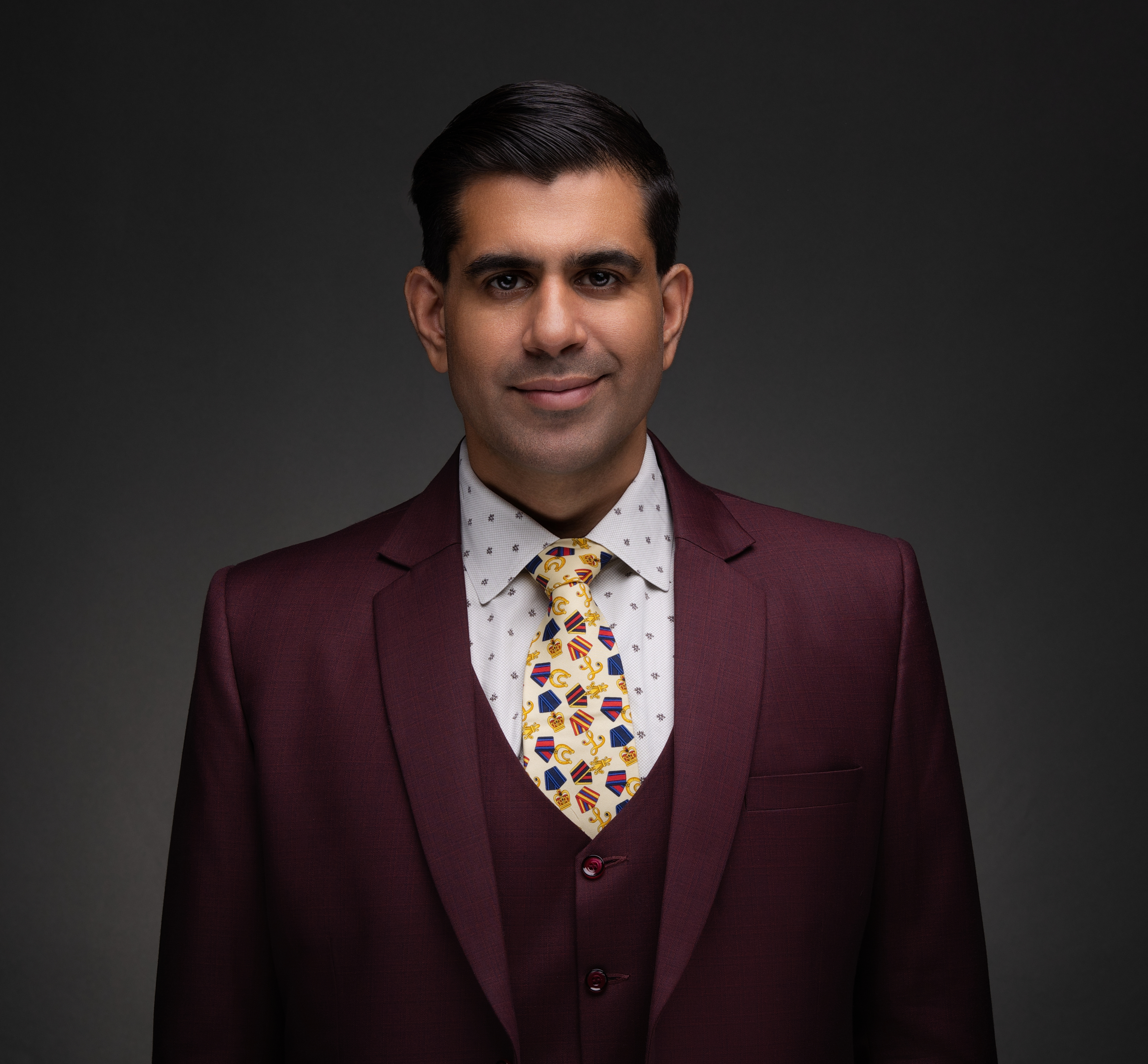Should I Stay or Should I Go?

Scott Palmer. Photo by Chris Crisman
VITAL STATISTICS
Scott Palmer
POSITION Principal software developer, R&D
AGE 37
GOAL To decide whether to leave an established career for an uncertain future in the law
When Joe Strummer, front man for the punk rock band the Clash, sang “Should I stay or should I go?” he could have been speaking for Scott Palmer.
Palmer, a full-time software developer and part-time law student, has worked his way up the corporate ladder to a senior management position in research and development at a Baltimore software company. But he can’t shake the idea that he’d really like to be a lawyer.
Palmer’s obsession with the law goes back some 20 years to when his grandfather died, leaving behind a sizable estate. Palmer says the lawyers who handled the estate bungled it, and the only legacy that he now has of his grandfather is years of protracted litigation between family members.
“I have lived through the effects of good and bad lawyering for the last 20 years,” he says. “I always thought someone should be able to do it better, and someone should be able to help us.”
Though Palmer originally considered law school as an immediate, post-collegiate option, he decided to forsake it for the world of high tech. But a couple of years ago, banking on his seniority at work and its attendant flexibility, Palmer decided to attend law school at night.
Now, with his J.D. degree in sight, Palmer doesn’t know whether he should stay at his current job or venture into a possibly lower-paying, more stressful career in the law. While he is comfortable in his current job, he is seeking more challenge and wonders whether he will find that in the law.
Because of the lasting sting of the litigation over his grandfather’s estate, Palmer always had an interest in elder law. He also has a strong desire to help people directly. But given his work experience, he says it might make more sense for him to pursue an intellectual property or technology law practice. And he isn’t sure how many law firms will want to hire an almost 40-year-old, newbie lawyer coming to the practice as a second career.
Complicating matters is Palmer’s biological clock. It is ticking loudly, he says, and he wants to make sure that if he does pursue a legal career he finds one that will value the experience he brings rather than the number of hours he can bill.
“I definitely know that I don’t want to work in a traditional big law firm where I will be staying until 10:30 every night. I don’t work well in that kind of environment,” says Palmer, whose expected graduation date is December 2008. “I am leaning toward a smaller firm that will afford me the lifestyle angle that I like.”
While Palmer says he is ready to take a pay cut if it means finding the right type of firm, he also is cognizant that he needs to earn a good living if he wants to continue to pay his mortgage and help support a wife and kids.
“Am I being unrealistic?” he asks. “I am no stranger to hard work, but I want to make sure that when I am thinking [about changing careers] and comparing one to the other, I am being realistic.”
Palmer should consider himself lucky to have so many options, says Life Audit work-life balance expert M. Diane Vogt. Sometimes the luxury of choice creates more complications, so Vogt wants Palmer to fully explore all of his options in order to better assess whether a career change is really the right move for him.
MAKING AN INFORMED DECISION
Because Palmer has no real legal experience, Vogt first wants him to get a clerkship or summer associate position at a firm to see if he actually likes the work and culture.
“You have a lot at stake because you have already built a successful career and are in senior management,” she says. “There is a lot to be said for continuing an upward trajectory in a field you like.”
Once Palmer gains some real experience working in a law firm, he needs to decide whether he likes it enough to ditch what he has. Because of his 15-year flirtation, Vogt suspects he is ready to make the leap. “Then the challenge for you will be to figure out the kind of law job you want.”
Getting married and having children are “vastly time-consuming,” Vogt says, “and that is the thing that people underestimate: Getting started in the practice of law is also a hugely time-consuming prospect.”
Vogt says Palmer’s maturity and experience will make him a faster learner and a more efficient new lawyer, and she encourages him to use those traits to his advantage.
“A lot of new grads have not held a full-time job or, if they did, it was not an important job to them. You have a lot of experience with time management, allocating resources and not going off on tangents or in the wrong direction,” says Vogt. “You will be able to hit the ground running while other new grads will not. And, particularly if you go into a technical field, you will really be able to hit the ground running.”
While Palmer continues to lean toward an elder law practice, Vogt says he might find the best opportunities in a high-tech or IP practice and should seriously consider leveraging his work experience in a legal career. “Most lawyers don’t feel comfortable with technical matters. And that, again, is an advantage you have and you should view it that way.”
Vogt suggests that Palmer explore as many practice areas as possible to help him weigh his options. If he still remains intent on a career in elder law, she thinks his maturity can be an advantage in the job market. Because elder lawyers often have to delve into their clients’ financial resources, Vogt believes Palmer will carry more credibility as a more mature lawyer than a younger one would.
Elder law, however, tends not to be as lucrative a practice area as others. Vogt says Palmer also should consider trusts and estates work that can be more financially rewarding in the long run than elder law. But, given Palmer’s goal of changing careers and his marital status, Vogt continues to steer him back toward a practice in high-tech or IP law, where salaries tend to be higher.
Vogt also wants Palmer to explore a move to another high-tech company where his J.D. degree might provide advancement opportunities. Many businesses value law degrees as much as MBAs and he may find that his new graduate degree will bring him new opportunities in a world in which he is already quite comfortable and successful. “You have to also think about the financial rewards in making the decision to move up in your field, practice law in a technical field or move on to elder law,” she says.
And no matter what path Palmer decides to follow, Vogt urges him to start down it soon. “You are in a very good spot because you are thinking about these things ahead of time,” Vogt tells Palmer. “You have several very good options because you have the opportunity to choose among several different paths, and a lot of new grads don’t have those options.”

M. Diane Vogt
OUR EXPERT
M. Diane Vogt
Tampa-based lawyer Vogt is a principal in PeopleWealth, a consulting firm devoted to improving job satisfaction for lawyers. She is the co-author of the ABA-published Keeping Good Lawyers: Best Practices to Create Career Satisfaction
LIFE AUDIT HOT TIP:
Keep On Asking the Journal!
Over the past year, the ABA Journal has undergone myriad changes designed to bring readers the most relevant, challenging and timely information about trends in the practice and the profession. Now those changes are coming to the back pages of the magazine—meaning this will be the last installment of Life Audit in its current form. We’ll still be here to give advice, just in a different format. So keep sending your questions about work-life balance, your career and your finances to Jill Schachner Chanen.
Write a letter to the editor, share a story tip or update, or report an error.


